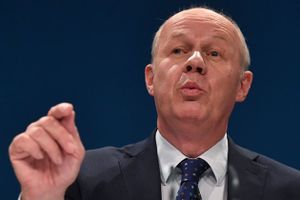Damian Green
( politician) | ||||||||||||||||||||||||||||||||||||||||||||||||||
|---|---|---|---|---|---|---|---|---|---|---|---|---|---|---|---|---|---|---|---|---|---|---|---|---|---|---|---|---|---|---|---|---|---|---|---|---|---|---|---|---|---|---|---|---|---|---|---|---|---|---|
 | ||||||||||||||||||||||||||||||||||||||||||||||||||
| Born | Damian Howard Green 1956-01-17 Barry, Wales | |||||||||||||||||||||||||||||||||||||||||||||||||
| Alma mater | Oxford University/Balliol College | |||||||||||||||||||||||||||||||||||||||||||||||||
| Religion | Roman Catholicism | |||||||||||||||||||||||||||||||||||||||||||||||||
| Children | 2 | |||||||||||||||||||||||||||||||||||||||||||||||||
| Spouse | Alicia Collinson | |||||||||||||||||||||||||||||||||||||||||||||||||
| Member of | Georgetown Leadership Seminar/1988, Inter-Parliamentary Alliance on China | |||||||||||||||||||||||||||||||||||||||||||||||||
| Party | Conservative | |||||||||||||||||||||||||||||||||||||||||||||||||
UK politician
| ||||||||||||||||||||||||||||||||||||||||||||||||||
Damian Howard Green (born 17 January 1956) is Minister of State for Immigration in the Home Office.[1] He is a former financial journalist, television producer, policy advisor and political lobbyist. [2]
Critic of the BBC
In 1991 the Centre for Policy Studies published a pamphlet by Green called A Better BBC: public service broadcasting in the 1990s. Green had spent much of the 1980s working in at Channel 4, but had also worked at The Times and the BBC [3] where he was a Producer in the Financial Unit from 1980 to 1982. [4] He would go on to become a Policy Advisor to John Major, a political lobbyist, and then a Conservative MP. [5]
Green's report attempted to develop a middle ground between the push for the BBC's privatisation coming from the neoliberals, and the support for quality national broadcasting amongst more traditionally minded Conservatives. The report is was somewhat unusual in that Green conceded that 'there is little evidence that the public is opposed to the concept of public service broadcasting... or that there is a wave of feeling that the BBC fails to help realise that concept.' [6] Neither was he supportive of the common assertion that the BBC had a systematic left-wing bias. The report was more typical in its criticism of the BBC as wasteful and inefficient. Its main argument in favour of reform though was that changes to the 'broadcasting landscape' meaning an increase in the number of channels, would necessarily make the BBC's exclusive right to the licence fee revenues 'indefenisible'. [7]
Green rejected advertising and subscription as alternative sources of funding. Instead he argued that the licence fee should remain, but that its revenues should be distributed by a new 'Public Service Broadcasting Authority' which would then commission public service broadcasting, initially overwhelmingly from the BBC, but also to private producers and Cable TV companies. [8] This, Green argued, would encourage competition and efficiency in the BBC and would guarantee that public service broadcasting was not undermined. The inevitable loss in revenue would then be met by the BBC 'marketing the range of BBC programmes' international, and from entering into joint productions and sponsorship deals. [9] 'If,' Green wrote, 'it eventually transpired that all the functions at present served by the BBC could indeed be provided by the market (with assistance from the PSBA), then the BBC could wither away, or be transformed into a much smaller and more concentrated broadcasting organisation.' [10]
References
- ↑ Full list of new cabinet ministers and other government appointments, guardian.co.uk, 13 May 2010.
- ↑ ‘GREEN, Damian Howard’, Who's Who 2009, A & C Black, 2008; online edn, Oxford University Press, Dec 2008 [Accessed 27 Nov 2009]
- ↑ Damian Green, ‘A Better BBC: public service broadcasting in the 1990s’, 10 November 1991; p.3
- ↑ ‘GREEN, Damian Howard’, Who's Who 2009, A & C Black, 2008; online edn, Oxford University Press, Dec 2008 [Accessed 27 Nov 2009]
- ↑ Ibid.
- ↑ Damian Green, ‘A Better BBC: public service broadcasting in the 1990s’, 10 November 1991; p.9
- ↑ Damian Green, ‘A Better BBC: public service broadcasting in the 1990s’, 10 November 1991; p.9
- ↑ Damian Green, ‘A Better BBC: public service broadcasting in the 1990s’, 10 November 1991; p.36
- ↑ Damian Green, ‘A Better BBC: public service broadcasting in the 1990s’, 10 November 1991; pp.36-37
- ↑ Damian Green, ‘A Better BBC: public service broadcasting in the 1990s’, 10 November 1991; p.38